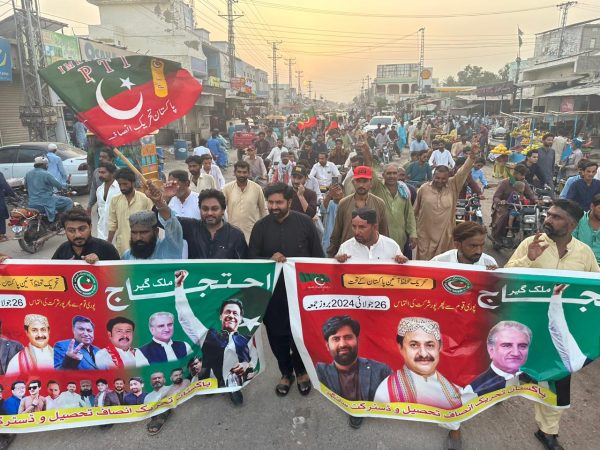Behavioral scientist Abraham Maslow’s instrumental law states that “if the only tool you have is a hammer, every problem looks like a nail.” Pakistani military spokesman Lt. Gen. Ahmed Sharif embodied the idea of instrumental law when he described Pakistan Tehreek-e-Insaf (PTI) social media criticism of the military as “digital terrorism” at a press conference on July 23. Sharif called attention to the PTI’s misinformation about the military on social media, saying that “digital terrorists” use mobile phones, computers, lies and propaganda to impose their will on society “like terrorists.”
Subsequently, members of PTI’s social media team, including PTI spokesperson Rauf Hassan and coordinator Ahmed Waqas Janjua, were arrested for alleged anti-national propaganda activities. Additionally, the Pakistani government has also set up a firewall to control social media, and X (formerly Twitter) remains banned indefinitely in Pakistan.
So what is the concept of “digital terrorism”? Pakistan’s military coined the term after it failed to suppress the PTI despite massive fraud in the February 8 general elections. Now, the military is struggling to keep former prime minister Khan in jail after the judiciary acquitted him and PTI founder in three high-profile cases registered before the February 8 elections. As a result, tensions between the judiciary and the military have also reached a boiling point. At a press conference, PM Sharif also complained about the slow progress in cases against the May 9 insurgents who attacked the army headquarters and other facilities.
“Terrorism” is a convenient label, “a way to distinguish who is bad.” As terrorism scholar Brian Jenkins noted in 1981, “Terrorism is done by bad people.” In any case, various countries weaponize anti-terrorism laws against political opponents to justify heavy-handed tactics. Terms such as “digital terrorism” are created to position political opponents as security threats. Terrorism is then used as a means to demonize and stigmatize them and justify violence against them. Moreover, states create justifications under the pretext of national interest and security to silence their voices and roll back their digital footprints. Such broad definitions of terrorism and blanket (over)use of anti-terrorism laws may be tactically beneficial in the short term, but they have proven counterproductive from a long-term strategic perspective. Simply put, there are no security solutions to political challenges.
Rapidly evolving socio-political, communication and technological changes have blurred the lines between criminal acts and terrorism, and genuine dissent and misinformation/disinformation campaigns, making it quite difficult to distinguish between the two. Nevertheless, terrorism is the planned use of violence against non-combatants to achieve political or ideological goals. Going by this definition, PTI’s anti-military propaganda campaign on social media can be categorised as a misinformation/disinformation campaign to mislead public opinion. At best, this falls under the category of cybercrime and not terrorism.
Similarly, the May 9 violence by PTI activists, which included attacks on government facilities, could be classified as rioting or an act of political violence and prosecuted under the Pakistan Penal Code.
Labelling political opposition and dissent in Pakistan as “digital terrorism” will have long-term negative impacts not only on Pakistan’s counter-terrorism operations, but also on democracy, freedom of speech, individual freedoms and digital rights.
First, the ongoing political turmoil in Pakistan represents a growing divide between the state and society, and the state’s strategy of positioning political issues as security threats will undermine efforts to combat terrorist organizations.
The opposition of political parties in Khyber Pakhtunkhwa to the recently announced counter-terrorism operation Azm-e-Isteqam (Resolve for Stability) is a good illustration of this. They have organised protests under the banner of Aman Pasoon, questioning the outcome of military offensives so far. Without public support, victory over terrorist organisations is difficult. The Tehreek-i-Taliban Pakistan (TTP) has capitalised on the growing distrust of the state and society by hailing the protests against Azm-e-Isteqam.
Second, the brazen use of anti-terror laws to suppress political dissent will have a negative impact on Pakistan’s embattled democracy, or what remains of it. Though Pakistan has not experienced a military coup in the last 15 years, the Economist Intelligence Unit’s Democracy Index 2023 report categorizes Pakistan as an “authoritarian regime,” highlighting the country’s greater deterioration of democracy than any other country in Asia. The weakening of democracy in the context of the Taliban’s return to power in Afghanistan and the TTP’s persistent demand for a Taliban-style theocracy in Pakistan will intensify Pakistan’s anti-democratic propaganda.
Finally, unless political conflicts are resolved politically, blanket bans or firewalls on platforms like X will not stop social media discussions and campaigns on it. Such a reckless approach is like sweeping the problem under the rug. In the digital age, people find innovative and creative ways to circumvent blanket bans and firewalls. In fact, it is ironic that the Pakistani government is violating its own policies by using a Virtual Private Network (VPN) to access X. Pakistan’s much touted shift from geopolitics to geoeconomics based on regional ties rings hollow as it shuts down a key communication platform that is central to building and fostering a healthy business environment in any country.
Unfortunately, the Pakistani security establishment’s strategy of securitizing politics has also politicized (internal) security, without causing any significant damage to the PTI.
Pakistan’s counterterrorism campaign has reached a turning point as the government struggles to maintain control in southern Khyber Pakhtunkhwa province, where it has asked locals to stay in their homes after 5 p.m. The army and other security agencies have also restricted people’s movements at night.
With the state and society divided, the three major extremist groups — TTP, Hafiz Gul Bahadur and Lashkar-e-Islam — have put aside their differences and formed an alliance for coordinated attacks. In this situation, the government should douse the political fires burning in the country by providing an outlet for the PTI and instead focus on restoring power through a new counter-terrorism operation.

